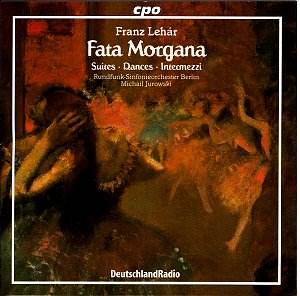Hereís breezy, undemanding music for the Christmas
season; full of Viennese operetta charm. This is mostly material from
Lehárís early years with just a few later selections from his
lesser-known work of the 1930s. It has to be said that much of it sounds
too familiar; thinly disguised variations of well-trodden material associated
with the genre: czárdás, polkas, light Ďchocolate-soldierí
marches and saccharine romantic lyricism.
The major work in this compilation is the ballet music
from Peter and Paul im Schlaraffenland (1906). It was
composed immediately after Die Lustige Witwe (The Merry Widow).
Its ten short movements are all charming and pleasant but they hardly
offer anything new or arresting although Ferkel-Tanz does have some
welcome bucolic humour (in one part the amusing orchestration and effect
might suggest a love-sick cow?). Even a piece with the title The
Fairy Tale from 1001 Nights hardly strays from Vienna; indeed its
castanets seem to suggest Spain!
Against this trend is the gently elegiac character
of The Preludium religioso, still with Lehárís typical lyrical
tone but with a violin solo full of sweet pathos. There is something
of Lehárís Prague teacher, Fibich in its character. Resignation,
from 1909, breathes some new life into the collection with more
deeply-felt music that has much more a feeling of sincerity and the
motif of renunciation of love that would later become so important in
Lehárís work. The Suite de Danse, a much later work from
1935, is endearing and it has much more interesting harmonies and some
interesting early figurations that might suggest a turbulent winter
evening outside the ballroom and whirling dancers in. The Chinese
Ballet Suite from 1937 is also attractive and demonstrates a penchant
for melody and tonal colours. The oriental influence is evident but
is often rather twee as though the scene was viewed "from the safety
of the Peking Embassy windows" - Vienna is never far away!
A pleasant undemanding compilation. For the most part,
early Lehár with more interesting music from the 1930s played
with enthusiasm and warmly recorded. For Lehár completists
Ian Lace

![]() Berlin Oberschöneweide
Berlin Oberschöneweide
![]() CPO 999 761-2 [67:55]
Fullprice
CPO 999 761-2 [67:55]
Fullprice